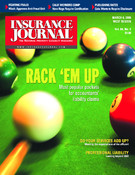There are opportunities to make California more earthquake-safe, according to the Institute for Business & Home Safety (IBHS).
At the recent meeting of the Little Hoover Commission, a state oversight agency that promotes efficiency, economy and improved government service, Harvey Ryland, president and CEO of IBHS, testified that “all levels of government have the opportunity to provide economic incentives for disaster prevention … In exchange for such incentives, the local, state and federal governments would be gaining the economic sustainability of communities, and reducing the costs of responding to disasters,” he said.
Ryland believes some of the opportunities to encourage disaster prevention include: excluding the value of disaster protection and related improvements from the calculation of real estate taxes, eliminating or reducing permit fees for the construction of a disaster-resistant structure, and giving that permit a high priority for expedited processing.
Without incentives, fewer actions will be taken, eliminating potential additional revenue, Ryland said. He also pointed out that should an event occur, state and local government will not only have to provide a greater level of service to the people whose homes and businesses were not protected, they will also risk losing any taxable value of properties that are destroyed.
“Any business that benefits from the stability and growth of a community could also provide incentives for structures with increased disaster protection,” he said. “For example, mortgage companies should give preferential interest rates and/or closing cost discounts for construction loans, home improvement loans and mortgages.” Similar federal programs, such as the National Flood Insurance Program, already exist, he added.
“We do know how to better protect people and property from earthquakes and other types of natural disasters. We also know how to educate the state’s citizens, and that one way to motivate them to take action is through financial incentives,” Ryland said.
The Little Hoover public hearing was held to ensure sufficient funding, accountability and incentives for improving emergency preparedness.
IBHS is a nonprofit initiative of the insurance industry that works to reduce the social and economic effects of natural disasters and other property losses.
Topics Catastrophe Natural Disasters
Was this article valuable?
Here are more articles you may enjoy.


 Married Insurance Brokers Indicted for Allegedly Running $750K Fraud Scheme
Married Insurance Brokers Indicted for Allegedly Running $750K Fraud Scheme  AIG, Chubb Can’t Use ‘Bump-Up’ Provision in D&O Policy to Avoid Coverage
AIG, Chubb Can’t Use ‘Bump-Up’ Provision in D&O Policy to Avoid Coverage  MAPFRE Denied Injunction Against AAA Auto Insurance Sales in Massachusetts
MAPFRE Denied Injunction Against AAA Auto Insurance Sales in Massachusetts  Trapped Tesla Driver’s 911 Call: ‘It’s on Fire. Help Please’
Trapped Tesla Driver’s 911 Call: ‘It’s on Fire. Help Please’ 


